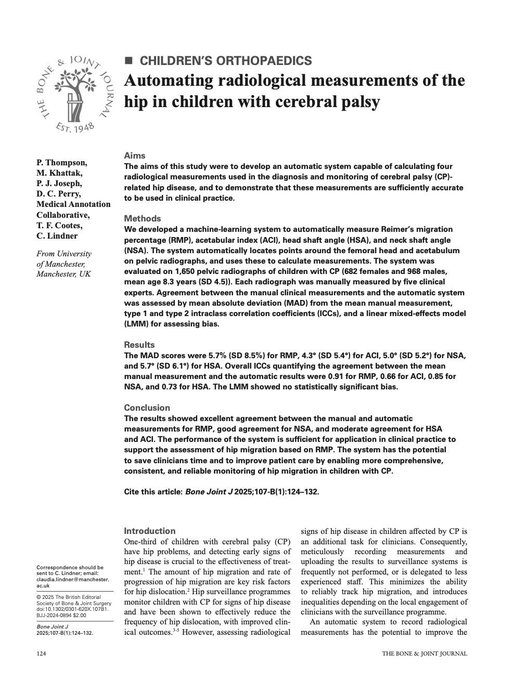AI in Medical Imaging: A Breakthrough for Cerebral Palsy Care
The integration of Artificial Intelligence (AI) in healthcare is transforming the landscape of medical diagnostics. Recently, a significant advancement has been made with the development of an AI tool designed to automatically interpret hip X-rays in children with Cerebral Palsy. This innovation is as proficient as human experts, marking a milestone in AI innovation in healthcare. The tool, developed by a team of researchers, aims to enhance the accuracy and efficiency of diagnosing hip-related issues in children suffering from this condition. For more details, visit the Bone & Joint Journal.
AI Tools in Healthcare: Expanding Horizons
The application of AI in medical imaging is not limited to hip X-rays. Researchers at the Indian Institute of Science (IISc) and Aster-CMI Hospital have developed an AI tool for detecting carpal tunnel syndrome (CTS). This tool uses a machine learning model based on transformer architecture, showcasing the potential of AI in diagnosing nerve disorders. The sentiment around this innovation is positive, with healthcare professionals and medical researchers expressing optimism about its impact on improving diagnostic accuracy.
AI in Early Cancer Detection
Another remarkable development in AI healthcare applications is the early detection of breast cancer. According to a report by MIT’s Computer Science and Artificial Intelligence Laboratory (CSAIL), AI technology has been able to detect breast cancer years before it develops. This breakthrough has the potential to significantly impact the healthcare and radiology sectors, offering early intervention and better patient outcomes.
AI in Postpartum Hemorrhage Risk Identification
AI’s role in healthcare is further exemplified by its application in identifying the risk of postpartum hemorrhage. Researchers at Brigham and Women’s Hospital have developed an AI tool that can rapidly and accurately identify this condition. The use of the Flan-T5 language model in this tool highlights the advancements in large language models and their application in medical research.
AI in Sports Injury Management
The impact of AI in healthcare extends to sports injury management. A portable device developed by IIT Madras, known as POCUS, uses AI to precisely detect sports injuries such as inflammation and muscle tears. This AI-driven POCUS scanner offers real-time evaluations, aiding coaches and physiotherapists in tailoring training programs and potentially reducing recovery time for athletes.
AI in Autism Diagnosis
AI is also making strides in the field of autism diagnosis. An AI model developed for predicting autism in toddlers has shown an accuracy rate of 80%. This development, as reported by Neuroscience News, has the potential to revolutionize autism diagnosis, enabling early intervention and improving the lives of individuals with autism and their families.
AI in Radiology
CARPL, an AI-powered radiology marketplace, is helping healthcare providers discover, explore, validate, and deploy AI applications for radiology workflows. This platform, as highlighted by TechCrunch, integrates with radiologists’ PACS workstations and focuses on validation and monitoring capabilities. The growing demand for AI solutions in healthcare and the increasing shortage of radiologists underline the importance of such innovations.
AI in Concussion Care
In the realm of neurology, AI is improving concussion care by predicting lasting symptoms through advanced neuroimaging techniques. The use of Diffusion Tensor Imaging (DTI) for concussion diagnosis, as reported by Neuroscience News, is leading to more personalized treatment plans and improved patient outcomes.
AI in Medical Diagnostics
The use of AI in medical diagnostics is further exemplified by the efforts of companies like Qure.ai. The Mumbai-based startup has raised $65 million to accelerate AI-driven medical diagnosis, serving over 90 countries with its AI-powered medical imaging solutions. This development, reported by Analytics India Magazine, highlights the global impact of AI in healthcare diagnostics.
AI in Patient Care and Health Communication
AI is revolutionizing patient care and health communication, as emphasized by the director of AIIMS, Delhi. The institution is investing over Rs 300 crore in digital infrastructure to ensure that every stakeholder benefits from AI integration. This investment, as reported by the Economic Times, underscores the transformative potential of AI in healthcare.
Related Articles
- Radiologist AI Teamwork Demonstrated for Report Generation
- AI Revolutionizes Tumor Detection in Neurosurgery
- AI in Healthcare: OpenAI’s O1 Preview and the Future of Medical Diagnosis
- AI Tools in Healthcare Industry
Looking for Travel Inspiration?
Explore Textify’s AI membership
Need a Chart? Explore the world’s largest Charts database
